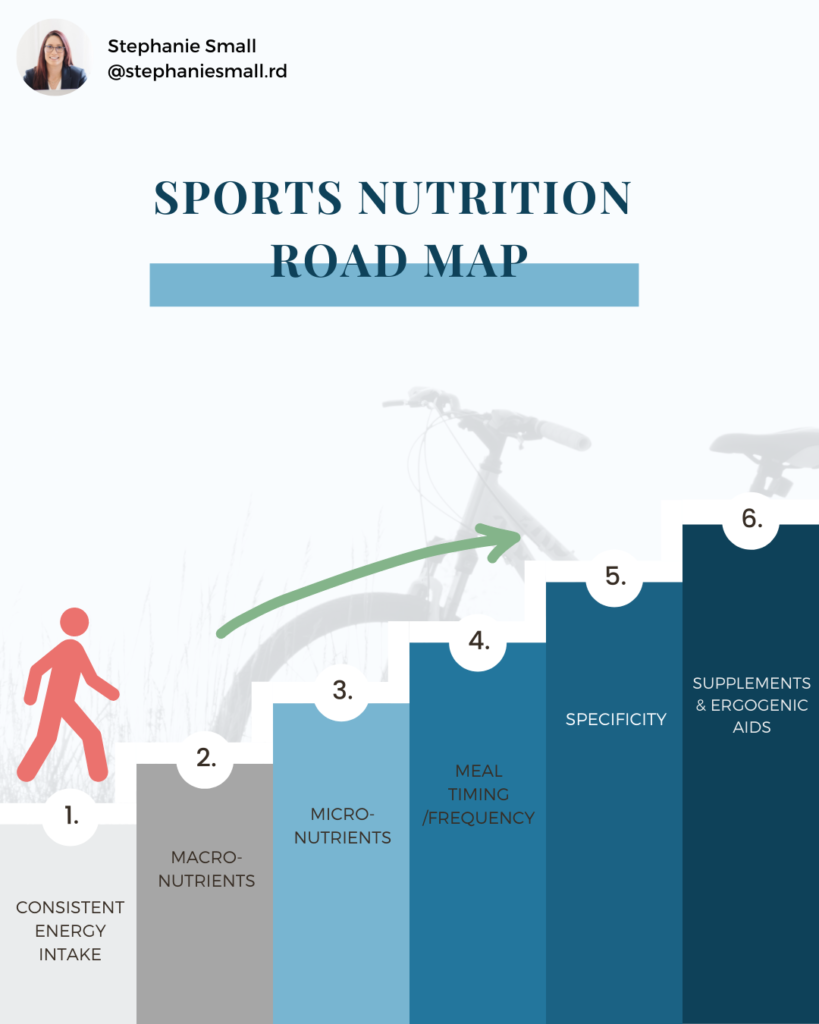
Sports nutrition is no longer about giving the football team more Gatorade or precisely prescribed macro ratios to be the leanest athlete around.
Sports nutrition is being redefined within the industry and society.
The more I coach people at all levels, ages, and skills, I have begun to hone my skills as a registered dietitian and coach to help them perform better and help people live more balanced and fulfilling lives outside of just nutrition.
Because peak performance truly doesn’t matter at the cost of a fulfilled and healthy life long term.
Here are the 5 rules of sports nutrition that my clients and I follow to fuel their best life!
Rule #1: Redefine what it is to be an “athlete”
Do you consider yourself an athlete?
Yes, there is a normal standard of being an “athlete” where you live, breathe, and train for some competitive event where you have to perform your best.
I see it as we are training for life, and we are trying to perform our best day in and day out. Like a typical athlete, we have to ensure proper nutrition, be physically active in a way that works for us, find time to rest and recover, and mental health is also part of that equation.
We are all unique athletes! And should be treated as such.
What type of athlete are you:
- Corporate athlete
- Recreational athlete
- Soccer mom athlete
- Endurance athlete
- Construction worker (ya’ll are a beast on-site)
- Student-athlete in the classroom or on the field
So as an athlete, are you practicing for a healthy and fulfilled life?
Because you are unique, so is your nutrition. This does not mean that you have vastly different nutrition recommendations than the next person, and it means that you have specific nutrition needs based on who you are, what your day, and what you want.
Rule #2: It’s more than just weight loss
Sports nutrition is no longer about losing weight, thinness, or being the leanest.
Quite frankly, being lean doesn’t add value to your life, and it takes away. The cost of being extremely lean is a compromise to your physical, mental, and social health.
Physique models and bodybuilders are some of the most unhealthy individuals, and they know it. Their extreme lifestyle may seem glorious when they step on stage or take photos, but secrets off the stage remain untold.
If I am honest, there is no data to support that a specific weight or body composition is superior to another.
There is literature to support a healthy lifestyle and not excess body fat regarding health and longevity. BUT it is not the sole predictor of health and quality of life.
Sports nutrition is about how to fuel to perform, fuel to recover, fuel for health, and so much more.
I promise you that once you take a step away from the scale and focus on the other ways nutrition can positively impact your life, your relationship and mental health around food will transform. I will note that it does not happen overnight.
Rule #3: Mental and social health are just as important
You, as an athlete, are real and unique individuals.
A nutrition plan that works for you considers your biological factors and your social and psychological factors.
Are you a busy mom of four?
Do you commute 1.5 hours to work each way?
Are you a full-time student, working part-time, with an internship trying to add on some volunteer hours?
Are you an accountant during tax season?
All of the factors matter. See figure 1 below, a model that demonstrates the factors of why an athlete may undereat and overtraining. It all starts with external factors.

So if you are struggling to stick with a nutrition plan, understand that it is not only about motivation and dedication. There may be other external factors at play, which additionally support that individuality to your nutrition program as an athlete.
So when working with a sports dietitian, if they don’t ask about all aspects of your life, they aren’t genuinely customizing your nutrition strategy. It is not being nosy, and we don’t need to know the detail, and we need to know what is going on around you to best help you.
Our education dives further than just nutritional sciences, and we have extensive training on counselling and motivational interviewing techniques, to name a few.
Rule #4: Don’t forget about the basics
Yes, nutritional science has come a long way, and there are pretty awesome nutrition strategies out there.
Here is a secret: those strategies don’t work unless you have mastered the basics.
While I can calculate a specific macro ratio or create a nutrition timing protocol, that will not help you unless you are under the fundamentals.
Before starting the following new and shiny thing, consider mastering these fundamental skills:
- Meal planning and prepping for the week
- Consistent nutrient intake
- Adding more minimally processed foods
- Understanding how to build a plate based on activity level
- Incorporate a balance of lean proteins, complex carbs, and healthy fats
The basics are where you get the biggest bang for your buck (see figure 2)

Figure 2: Sports nutrition roadmap of the fundamentals
Rule #5: It’s more than just about today’s nutrition but long term health as an athlete
We are in this for the long haul.
While people live longer than ever, it is also essential that health follows.
It’s great to live beyond your 80s but does that even matter if your bed bound and can’t even feed yourself. It sounds harsh, but that is the reality.
Quality of life for the long term starts now. No quick fixes here.
If you find value here, please share with a friend on the blog or email list. It means the world to me when you spread my message to more humans.
